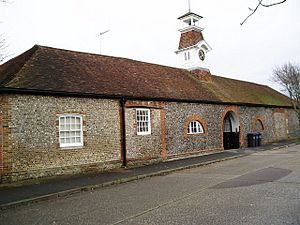Edward Alford (Colchester MP) facts for kids
Edward Alford (born around 1566 – died around 1632) was an important English landowner and politician. He served as a Member of Parliament (MP) in the House of Commons for many years, from 1604 to 1628. He was known for speaking his mind and standing up for what he believed was right in Parliament.
Early Life and Education
Edward Alford was born around 1566. His father was Roger Alford, and his mother was Elizabeth Ramsay. When he was about 15 years old, Edward went to Trinity College, Oxford to study. Following his father's wishes, he also studied law at Lincoln's Inn, which is a famous place for training lawyers.
A Career in Parliament
Edward Alford began his political journey in 1593 when he was elected as a Member of Parliament (MP) for Beverley. An MP is someone chosen by the people to represent them in Parliament and help make laws.
Later, in 1604, he was elected MP for Colchester. He was re-elected for Colchester many times, in 1614, 1621, 1624, 1626, and 1628. This shows how much the people of Colchester trusted him.
In 1621, Edward Alford was concerned about the King's safety. He also spoke up for freedom of speech in Parliament. He supported attacks on "monopolies," which were special rights given to certain people or companies that stopped others from doing business fairly.
In 1625, he was made High Sheriff of Surrey and Sussex. A High Sheriff was a royal official in a county. Sometimes, people were given this job to keep them busy and prevent them from attending Parliament, which might have been the case for Alford.
Despite this, he was re-elected for Colchester in 1626. People in Parliament were very happy to see him return. He said that this Parliament was the first time he saw important government advisors truly caring for the country. However, he was later removed from his role as a Justice of the Peace because he disagreed with some of the King's requests for money.
In 1628, Edward Alford was elected MP for Colchester again. He was also elected for Steyning, though it's not fully clear if this was him or his son.
The Petition of Right
One of Edward Alford's most important moments was his involvement with "The Petition of Right" in 1628. This was a very important document that aimed to protect the rights of English people and limit the King's power.
On May 8, 1628, the House of Commons created this petition and sent it to the House of Lords for approval. When the Lords sent it back with changes, Alford spoke strongly. He wanted to make sure that the King's power was based on law, not just on his own will. He said, "Let us give that to the King the Law gives him, and no more." This meant he believed the King should only have the powers allowed by law.
On June 21, 1628, when the House of Lords approved the Petition of Right, Alford reminded everyone that it was important to thank them. He then retired to his home at Offington in West Sussex.
Edward Alford was buried in the church at Hamsey, near Lewes, Sussex.
Family Life
Edward Alford married Judith Downing. They had six sons. Three of their sons, John, Henry, and Edward, also became Members of Parliament, following in their father's footsteps.


